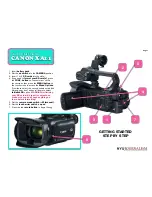
Others
-54-
Do not use your Movie Camera near radio
transmitters or high-voltage cables.
≥
If you record pictures near radio transmitters or
high-voltage cables, recorded images or sounds
may be adversely affected.
Do not use this Movie Camera for surveillance
purposes or other business use.
≥
If you use the Movie Camera for a long period of
time, the internal temperature increases and,
consequently, this may cause malfunction.
≥
This Movie Camera is not intended for business
use.
When you use your Movie Camera on a beach
or similar place, do not let sand or fine dust
get into the Movie Camera.
≥
Sand or dust may damage the Movie Camera or
Cassette. (Care should be taken when inserting
and removing the Cassette.)
Do not spray insecticides or volatile
chemicals onto the Movie Camera.
≥
If the Movie Camera is sprayed with such
chemicals, the camera body may be deformed
and the surface finish may peel off.
≥
Do not keep rubber or plastic products in
contact with the Movie Camera for a long period
of time.
Do not use benzine, thinner or alcohol for
cleaning the Movie Camera.
≥
The camera body may be deformed and the
surface finish may peel off.
≥
Before cleaning, detach the Battery or pull out
the AC Mains Lead from the AC mains socket.
≥
Wipe the Movie Camera with a soft dry cloth. To
remove stubborn stains, wipe with a cloth that is
soaked in a detergent diluted with water and
afterwards finish wiping with a dry cloth.
≥
For storing or transporting the Movie Camera,
place it in a bag or case lined with soft pads so
as to prevent the coating on the camera body
from being worn.
After use, be sure to take the Cassette out and
detach the Battery from the Movie Camera or
pull out the AC Mains Lead from AC mains
socket.
≥
If the Cassette is left in the Movie Camera, the
tape sags and deteriorates.
≥
If the Battery is left on the Movie Camera for a
long time, the voltage drops excessively, and
the Battery will not function even after it is
recharged.
ª
About AC Adaptor
≥
If the temperature of the Battery is extremely
high or extremely low, the [CHARGE] Lamp
may continue flashing, and the Battery may not
be charged. After the temperature of the Battery
has decreased or increased sufficiently,
charging starts automatically. If the [CHARGE]
Lamp continues to flash even after the Battery
temperature has decreased or increased
sufficiently, the Battery or AC Adaptor may be
faulty. In this case, please contact a dealer.
≥
If the Battery is warm, charging takes a longer
time than normal.
≥
If you use the AC Adaptor near a radio, radio
reception may be disturbed. Keep the AC
Adaptor 1 metre or more away from radio.
≥
When using the AC Adaptor, it may generate
whirring sounds. However, this is normal.
≥
After use, be sure to pull out the AC Mains Lead
from the AC mains socket. (If they are left
connected, a minute amount of current is
consumed.)
≥
Keep the electrodes of the AC Adaptor and
Battery always clean.
ª
Condensation
If you turn the Movie Camera on when
condensation occurs on the head or the tape,
Condensation Indication [
3
DEW] (yellow or red)
blinks on the Viewfinder or the LCD monitor and
the messages [DEW DETECT] or [EJECT TAPE]
(only when the tape is inserted) appear. In this
case, follow the procedure below.
Blink in yellow:
Dews are slightly adhering on the head or the
tape.
Blink in red:
Dews are adhere on the head or the tape.
1
Remove the tape if it is inserted.
≥
It takes about 20 seconds to open the
Cassette Holder. This is not a malfunction.
2
Leave the Movie Camera with the Cassette
Compartment Cover closed to cool or warm
it to the ambient temperature.
When [
3
DEW] blinks in yellow
≥
You cannot use the Tape Recording/
Playback Mode. Leave the Movie Camera
for about 30 minutes.
≥
However, you can use the Card Recording
Mode or Picture Playback Mode when the
cassette is not inserted.
When [
3
DEW] blinks in red
≥
The Power Indicator Lamp blinks for about 1
minute and then the Movie Camera
automatically turns off. Leave it for about 2
to 3 hours.
15B-ENG.book 54 ページ 2004年2月2日 月曜日 午後4時45分











































